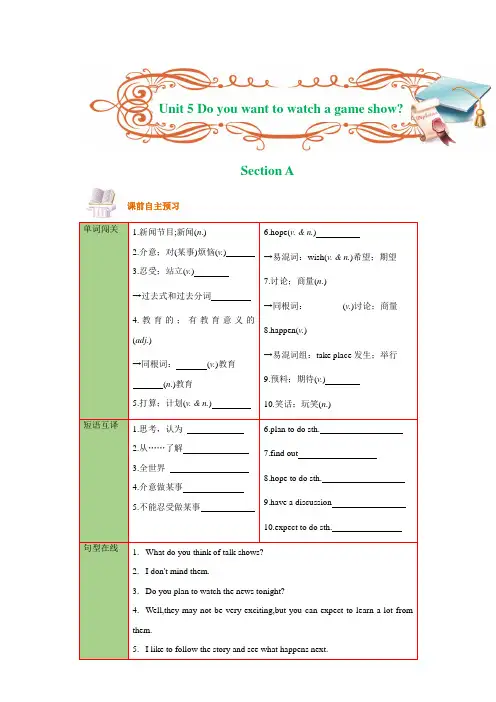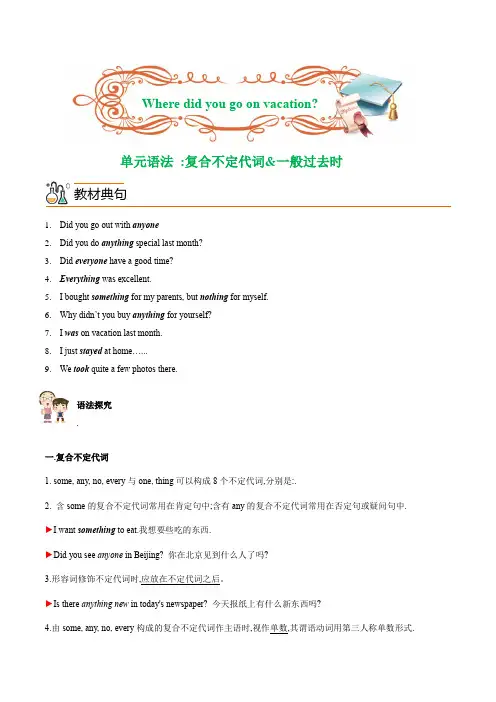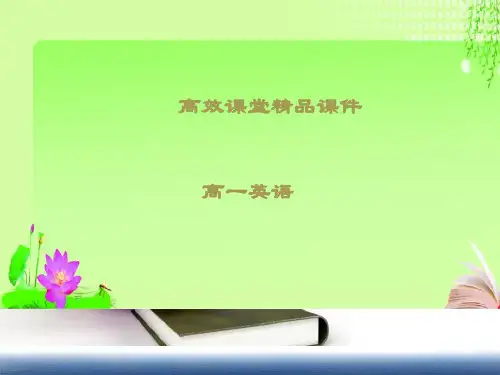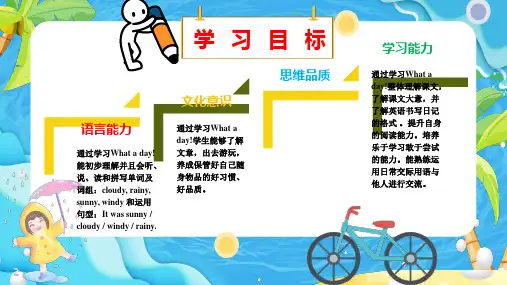英语高效课堂 优质课件
- 格式:ppt
- 大小:570.51 KB
- 文档页数:7



Section A单词闯关1.新闻节目;新闻(n .)________2.介意;对(某事)烦恼(v.)3.忍受;站立(v.)→过去式和过去分词4.教育的;有教育意义的(adj.)________→同根词: (v.)教育 (n .)教育5.打算;计划(v. & n.)6.hope(v. & n.) →易混词:wish(v. & n.)希望;期望7.讨论;商量(n .)________→同根词:________(v.)讨论;商量8.happen(v.)________→易混词组:take place 发生;举行 9.预料;期待(v.) 10.笑话;玩笑(n .)________ 短语互译1.思考,认为2.从……了解3.全世界4.介意做某事5.不能忍受做某事6.plan to do sth.7.find out8.hope to do sth.9.have a discussion10.expect to do sth.句型在线1. What do you think of talk shows?2. I don't mind them.3. Do you plan to watch the news tonight?4. Well,they may not be very exciting,but you can expect to learn a lot from them.5. I like to follow the story and see what happens next.课前自主预习Unit 5 Do you want to watch a game show?6.I can't stand them.知识梳理1.news(n.)新闻节目;新闻【观察】Do you plan to watch the news tonight? 今晚你打算看新闻吗?►The news is about the forest fire. 那则新闻是关于森林大火的。




Where did you go on vacation?单元语法:复合不定代词&一般过去时教材典句1.Did you go out with anyone2.Did you do anything special last month?3.Did everyone have a good time?4.Everything was excellent.5.I bought something for my parents, but nothing for myself.6.Why didn’t you buy anything for yourself?7.I was on vacation last month.8.I just stayed at home…...9.We took quite a few photos there.语法探究.一.复合不定代词1. some, any, no, every与one, thing可以构成8个不定代词,分别是:.2. 含some的复合不定代词常用在肯定句中;含有any的复合不定代词常用在否定句或疑问句中.►I want something to eat.我想要些吃的东西.►Did you see anyone in Beijing? 你在北京见到什么人了吗?3.形容词修饰不定代词时,应放在不定代词之后。
►Is there anything new in today's newspaper? 今天报纸上有什么新东西吗?4.由some, any, no, every构成的复合不定代词作主语时,视作单数,其谓语动词用第三人称单数形式.►Everyone is at school today.今天大家都在学校.5. 在疑问句中,当表示说话人希望得到肯定回答或表示请求,建议时,用some而不用any.►Would you like some more apples?Yes, please.【同步拓展】二.一般过去时1. 包含be动词的一般过去时的句式①肯定句,否定句及一般疑问句的句式►I was at home yesterday.我昨天在家.►I wasn't at home yesterday.我昨天不在家.►Were you at home yesterday? 你昨天在家吗?Yes, I was. / No, I wasn't.是的,我在家./不,我不在家.②特殊疑问句式:特殊疑问词+was/were+ 主语+其他?►Where were you last Sunday? 上周日你在哪儿?2. 包含实义动词的一般过去时的句式①肯定句句式:主语+动词过去式+其他.►He stayed at home last night.昨晚他待在家里.②否定句句式:主语+did not/didn't+动词原形+其他.►They didn't go shopping last week.上周他们没有去购物.③一般疑问句句式:Did+主语+动词原形+其他?肯定回答:Yes,主语+did.否定回答:No,主语+didn't.►Did he go to Guangzhou yesterday? 昨天他去广州了吗? Yes, he did. /No, he didn't.④特殊疑问句句式A:特殊疑问词+did+主语+动词原形+其他?►What time did he get to school this morning? 今天上午,他是几点到达学校的?►Where did your sister go last night? 昨天晚上你,妹妹去哪里了?B.特殊疑问词+动词过去式+其他?►Who helped you solve the problem? 谁帮你,解决了这个问题?分层训练A级-基础达标一、用所给单词的正确形式填空1.Gina and Tim _______ (come)to China last year.2.He ________(go)to see a film yesterday evening.3.I ________(buy)a toy bear for my son this morning.4.I _________(stay)at home and ________(watch)TV last night.5.There ________(be)enough milk at home last week,wasn't there?6.What time ________ you ________(put)the ball into the box last night? 7.—What did you do yesterday?—We _________(visit)a famous singer.8.The bird was scared and it ________(fly)away soon.9.There _________(be)many trees on the mountains five years ago.二、单项选择10.Is there ________in today’s newspaper?A.something interesting B.interesting somethingC.anything interesting D.interesting anything11.—It’s time to begin our meeting now. Is ______ here?—No. Ben and Jill are still on the way.A.someone B.no one C.anyone D.everyone 12.— I can’t learn English well. What can I do, Mr. Smith?— Tom, ________ is difficult if you work hard.A.something B.nothingC.anything D.everything13.—Did you buy________?—No, I bought nothing.A.something special B.anything special C.special something D.special anything 14.Have you seen my mobile phone, Sam? I can’t find it ________ .A.everywhere B.somewhere C.nowhere D.anywhere 15.Have you seen my mobile phone, Sam? I can’t find it________.A.everywhere B.somewhere C.nowhere D.anywhere 16.Children, follow your heart and never let ________ steal your dreams.A.someone B.anyone C.everyone D.nobody三、多句选词填空17.Mother wants to buy me ________ as my birthday present.18.He didn’t do ________ interesting last Sunday. He just stayed at home and watched TV. 19.________ is wrong with the radio. It’s all right.20.I can’t find my pen. Maybe ________ is using it.21.There isn’t ________ in the classroom. The students are on the playground.四、改写句子22.Tony bought something for his friends last weekend. (改为一般疑问句)Did Tony ________ ________ for his friends last weekend?23.Sam went to Hong Kong last summer. (改为一般疑问句)______________ Sam ______________ to Hong Kong last summer? 24.The children had a good time at the party yesterday. (改为否定句) The children ________ ________ a good time at the party yesterday. 25.My cousin has nothing interesting to tell you. (改为同义句)My cousin doesn’t ________ ________ interesting to tell you.B级-能力提升一、按要求完成下列句子。




Unit 3I'm more outgoing than my sister.单元语法聚焦三:形容词和副词的比较级和最高级教材典句1.Is Tom smarter than Sam?2.Is Tara more outgoing than Tina?3.I think she sang more clearly than Nelly.rry is much less hard-working.语法探究一、概念大多数形容词和副词有三个等级:原级,比较级和最高级。
本单元讲述两方面内容:①形容词和副词的比较级和最高级的构成;②形容词和副词的比较级的用法。
一. 形容词和副词的比较级和最高级的构成1.规则变化:单音节词和部分双音节词在词尾加-er或-est,分为四种情况。
①一般在词尾加-er或-est。
如:long→longer→longest;hard→harder→hardest .②以不发音的字母e结尾的单词,加-r或-st。
如:nice→nicer→nicest .③以“辅音字母 +y”结尾的双音节词,先把y变为i,再加-er或-est。
如:easy-easier-easiest;early-earlier-earliest。
④重读闭音节词词尾只有一个辅音字母时,先双写该辅音字母,再加-er或-est。
如:big→bigger→biggest2.多音节词和部分双音节词,在其前加more和most来构成比较级和最高级。
careful-more careful -most carefulslowly→more slowly→most slowly3.不规则形容词和副词的变化汇总(初中必备)二.比较级的句型1.A+be+形容词比较级+than+B►This cake is nicer than that one. 这个蛋糕比那个好。
2.A+实义动词+副词比较级+than+B►I work harder than my brother. 我比我弟弟学习刻苦。
U nit 9Can you come to my party?单元语法:情态动词can的用法教材典句1.Can you come to my party on Saturday?2.Can you go to the movies tomorrow night?3.Can he go to the party?4.Can she go to the baseball game?5.Can they go to the movies?语法探究一、词性can是情态动词,它没有人称和数的变化,其后要接动词原形。
can的否定形式是can't,过去式是could,过去式的否定形式是couldn't。
could有时不表示can的过去式,而表示语气委婉的请求、邀请。
二、意义及用法1.表示能力:能,能够,会►-Can you drive a car?你会开车吗?►-Yes, I can. / No, I can’t.是的,我会。
/ 不,我不会。
►He could swim when he was five.他5岁时就会游泳。
【注意】be able to也可以表示能力。
can只有一般现在时和一般过去时两种时态,而be able to则有多种时态。
►I won’t be able to come this afternoon.今天下午我来不了。
2.表示允许:可以(可语中常代替may)►You can stay here for a few minutes.你可以在这儿待几分钟。
►You can’t take the book out of the room.你不能把这本书拿出这个房间。
3.表示请求、邀请,有时用could,表示语气更委婉。
►-Could / Can I use your pen?我可以用你的钢笔吗?►-Of course you can.当然可以。
(不能说“Of course you could.”)4.can还可以推测,但只能用在否定句中,can’t可译为“不可能”。